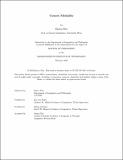Coarse Modality
Author(s)
Flor, Enrico
DownloadThesis PDF (1004.Kb)
Advisor
von Fintel, Kai
Iatridou, Sabine
Terms of use
Metadata
Show full item recordAbstract
One of the early successes of the application of possible worlds semantics to the analysis of natural language is Kratzer’s account of modality. A large part of the subsequent literature on modals has sought to expand the crosslinguistic coverage of that framework, and, in so doing, many new generalizations and constraints have been proposed and re-examined. The present dissertation situates itself within this tradition and makes both an empirical and theoretical contribution. Using the Italian adverb magari as the main empirical source, it will be argued that there exists a previously unnoticed type of modality which is referred to here as “coarse”. Its most evident manifestation is a special type of epistemic possibility, one that comes with an “antievidential” requirement. Antievidential possibility in assertions and questions is discussed in Chapters 1 and 3 respectively. Chapter 2 frames coarse modality as a more general phenomenon that comes about through modification of modal expressions. The theoretical argument of this dissertation is a novel corroboration of Kratzer’s premise semantics approach. It will be argued that the most natural and general account of coarse modality is possible by utilizing the premise set, a powerful resource of the system, in a novel way.
Date issued
2025-02Department
Massachusetts Institute of Technology. Department of Linguistics and PhilosophyPublisher
Massachusetts Institute of Technology